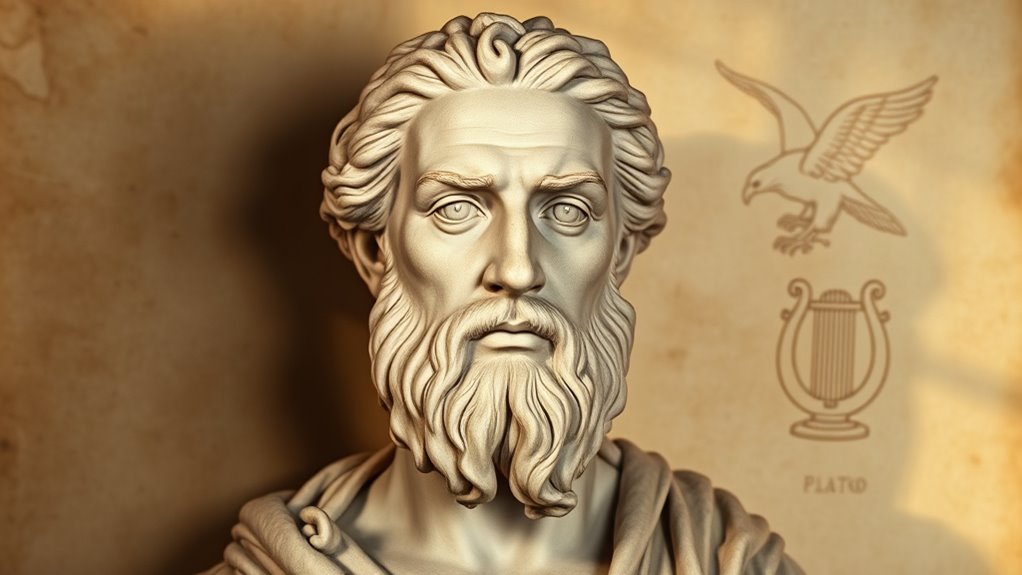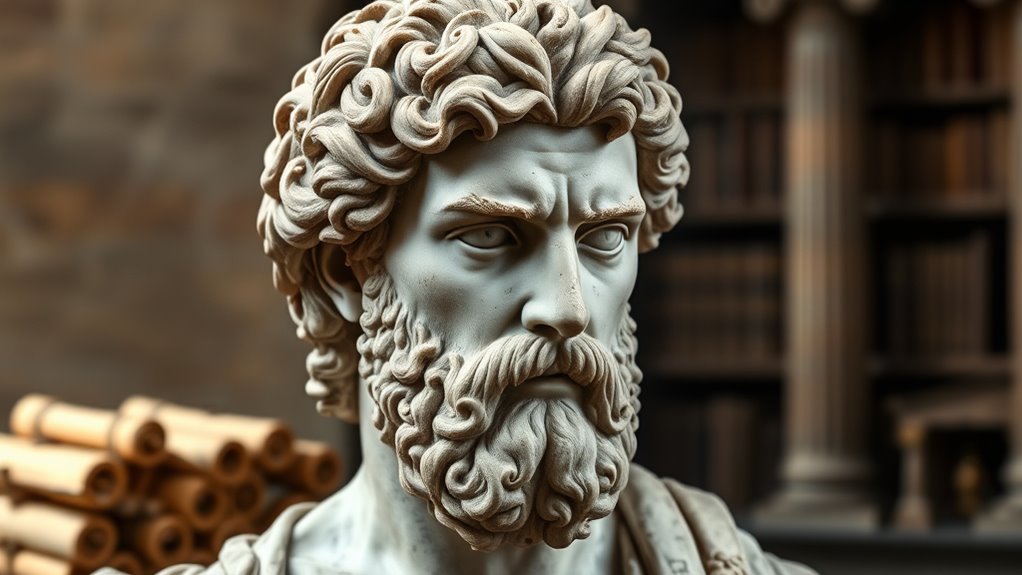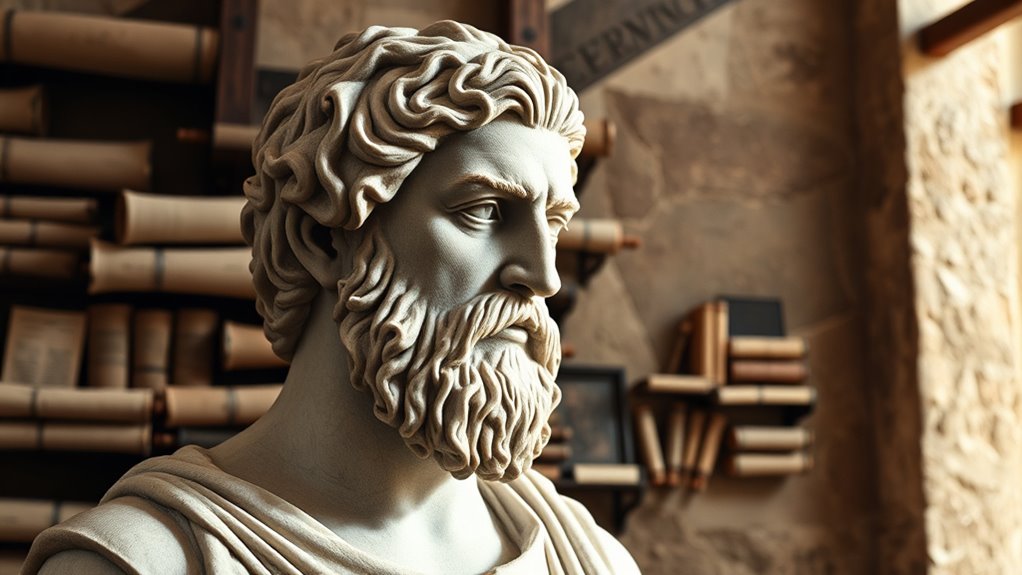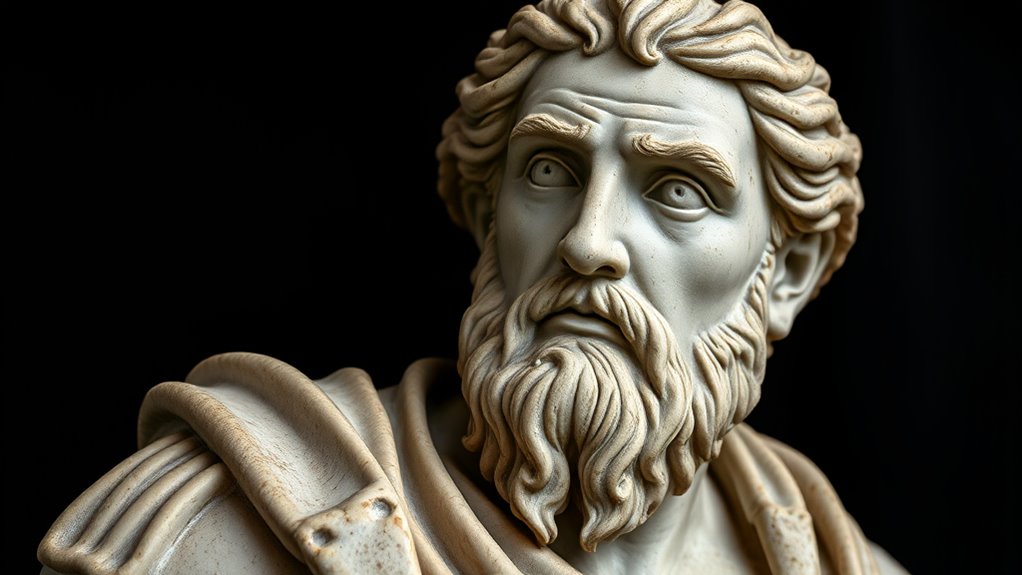Discover Posidonius, the Stoic polymath who masterfully blended philosophy, science, and geography. Born in ancient Syria and educated in Athens, he challenged materialism, emphasizing inner virtues, moral integrity, and emotional resilience. His eclectic approach integrated ideas from Plato and Aristotle, shaping systematic methods that influenced future science. If you explore his life further, you’ll uncover how his interdisciplinary insights continue to inspire understanding today.
Key Takeaways
- Posidonius was a Greek Stoic philosopher and polymath known for integrating philosophy, science, geography, and ethics.
- He emphasized empirical observation and scientific methodology, influencing later developments in natural science and geography.
- His eclectic approach combined Plato’s metaphysics with Aristotle’s systematic natural understanding, enriching Stoic thought.
- Posidonius taught that virtue and inner qualities are true goods, advocating emotional resilience and moral integrity.
- His interdisciplinary work and ethical teachings continue to inspire modern philosophical and scientific inquiry.
The Early Life and Education of Posidonius

Born in Apamea, a city in modern-day Syria, Posidonius began his education early in his hometown, where he developed a strong foundation in philosophy and the sciences. Growing up in ancient Syria, a region rich in cultural exchanges, he was exposed to diverse ideas that shaped his intellectual curiosity. His early studies laid the groundwork for his later engagement with Stoic origins, though he would eventually challenge some of its principles. Moving to Athens, he sought advanced philosophical training, blending his Syrian roots with Greek thought. This blend of ancient Syrian influence and Stoic philosophy fueled his eclectic approach and wide-ranging scholarly pursuits.
Posidonius’s Eclectic Philosophical Approach

After establishing his solid foundation in Stoic philosophy and sciences, Posidonius set out to broaden his thinking by embracing an eclectic approach. He integrated ideas from Plato and Aristotle, moving beyond traditional Stoicism, especially in understanding the soul and passions. His philosophy includes a thorough critique, emphasizing that external possessions like wealth and health aren’t true goods. Instead, he advocates for virtuous living, focusing on inner qualities that cultivate the soul’s integrity. By blending diverse philosophies, Posidonius aimed to develop an all-encompassing understanding of human nature and ethics, guiding individuals toward genuine virtue over external success. Additionally, his emphasis on continuous learning reflects his recognition of the importance of adapting and expanding one’s knowledge to achieve a more comprehensive philosophical outlook. His commitment to interdisciplinary exploration demonstrates his dedication to integrating empirical observations into his philosophical framework. Furthermore, his exploration of science and natural phenomena demonstrates his commitment to integrating empirical observations into his philosophical framework. Recognizing the importance of holistic understanding, he sought to unify various fields of knowledge to enrich his philosophical insights. This approach also underscores his awareness of the significance of Cultural Intelligence, enabling him to appreciate diverse perspectives and adapt his ideas across different cultural contexts.
His Contributions to Science and Geography

Posidonius made significant advances in science and geography by applying his broad intellectual pursuits to understand the natural world and its spatial relationships. He contributed to ancient navigation techniques by studying celestial bodies and ocean currents, improving navigation accuracy. His use of scientific methodology emphasized observation and logical reasoning, setting foundations for systematic geographic study. He mapped coastlines and landmasses, integrating astronomical data to enhance geographic knowledge. His work influenced later explorers and scholars, bridging philosophy with empirical research. Additionally, his innovative approaches to scientific methodology laid groundwork for future geographic explorations, highlighting the importance of spiritual insights from angel numbers in understanding the universe. Furthermore, his insights into regional legal resources helped shape navigation and exploration strategies in various parts of the ancient world, demonstrating his comprehensive understanding of geographical features and resources. Recognizing the significance of aura colors and their meanings also contributed to his holistic approach to understanding the interconnectedness of natural phenomena.
The Influence of Plato and Aristotle on His Thought

Posidonius’s broad approach to science and philosophy was deeply shaped by the ideas of Plato and Aristotle, whose theories he integrated into his own thinking. You see, Plato’s influence is evident in how he regarded the soul, passions, and the pursuit of knowledge, emphasizing the importance of the inner life. At the same time, Aristotle’s integration helped him develop a systematic understanding of nature, logic, and ethics, blending empirical observation with philosophical reasoning. This eclectic approach allowed Posidonius to move beyond simple Stoic principles, creating a more extensive worldview that unified metaphysics, science, and moral philosophy. Moreover, the cultural context of his era encouraged a synthesis of ideas, fostering innovative perspectives that bridged classical philosophies. His engagement with empirical methods further distinguished his work, as he sought to ground philosophical inquiry in observable phenomena. Additionally, his efforts to combine metaphysics and natural science exemplify this integrative philosophical methodology. Recognizing the importance of logical coherence, he aimed to create a comprehensive philosophical system that bridged various fields of knowledge. This synthesis was also influenced by the educational practices of his time, which promoted interdisciplinary learning and inquiry.
Key Ideas and Ethical Teachings

What are the core principles that guide Posidonius’s ethical teachings? You’re encouraged to prioritize virtue over wealth, recognizing that material possessions don’t define your character. He critiques materialism, warning it can lead to greed and distraction from true happiness. Instead, focus on inner qualities, cultivating wisdom, self-control, and moral integrity. Posidonius believed passions should be reasoned with, aligning desires with virtue. External goods like riches or health aren’t inherently good—they don’t guarantee fulfillment or moral growth. Your ethical path involves choosing social circles wisely, challenging circumstances, and valuing the soul’s development above external success. Emphasizing emotional regulation enables individuals to maintain moral balance amid life’s challenges, aligning with Stoic ideals. Developing resilience through mental discipline further supports one’s pursuit of virtue. Additionally, understanding the importance of spiritual connections can deepen one’s commitment to virtue and ethical living. Recognizing the role of ethical consistency helps in applying virtues across different areas of life, reinforcing moral integrity. Cultivating these qualities encourages a balanced and harmonious life, reflecting the Stoic pursuit of inner harmony.
The Legacy of His Writings and Thought

Although much of his work has been lost to history, the influence of Posidonius endures through citations and references by later thinkers. In the historical context of a rapidly expanding Roman Empire, his eclectic approach bridged Greek philosophy and scientific inquiry. His philosophical influence extended beyond Stoicism, shaping ideas on ethics, astronomy, and geography. Thinkers like Cicero and Livy drew on his insights, especially his integration of Plato and Aristotle into Stoic thought. Despite the limited availability of his original writings, he significantly contributed to scientific inquiry, fueling later philosophical and scientific developments, and his methods exemplified an interdisciplinary approach that remains relevant today. His work also highlighted the importance of empirical observation and systematic investigation, which influenced the development of scientific methodology. This cemented his role as a key figure in the legacy of Hellenistic thought.
Practical Lessons From Posidonius’S Philosophy

By applying the practical lessons from Posidonius’s philosophy, you can cultivate a more virtuous and resilient life. Recognize the materialism pitfalls that tempt you to value possessions over character, and remember that true happiness comes from inner virtue. Be mindful of social influence; surround yourself with people who uplift your ethical growth. Focus on developing your soul’s qualities rather than external riches or status. Embrace self-awareness and challenge external circumstances instead of blaming them. Cultivating these habits helps you resist superficial temptations and build resilience rooted in wisdom and virtue. Developing emotional resilience is essential to navigate life’s challenges with a Stoic mindset.
Frequently Asked Questions
What Specific Scientific Theories Did Posidonius Propose?
You’re curious about Posidonius’s scientific theories, especially regarding cosmological theories and astronomical observations. He proposed that the universe is infinite and eternal, challenging traditional views. He also believed celestial bodies influence Earth through natural laws, based on his extensive astronomical observations. His ideas integrated geometry and physics, fostering a scientific approach that connected the cosmos with natural phenomena, emphasizing reason and empirical evidence in understanding the universe.
How Did Posidonius’s Ideas Influence Later Stoic Philosophers?
Your curiosity about Posidonius’s impact reveals a legendary philosophical legacy. His eclectic ideas and emphasis on integrating Plato and Aristotle profoundly shaped later Stoic philosophers. By promoting reasoned passions and the importance of inner virtue, he extended Stoic influence beyond traditional boundaries. His teachings inspired a more flexible, holistic approach to Stoicism, influencing thinkers like Cicero and Seneca, and ensuring his ideas echo through philosophical history for centuries.
What Were Posidonius’S Views on the Nature of the Soul?
You learn that Posidonius viewed the soul as both physical and immortal. He believed the soul’s passions and desires are essential to human identity, aligning with Plato’s view. While acknowledging its physical aspect, he also saw the soul as eternal, capable of surviving bodily death. He emphasized that true virtue stems from inner qualities, not external riches, and that understanding the soul’s nature helps guide moral and philosophical life.
Did Posidonius Have Any Notable Political Achievements or Roles?
You might think Posidonius was just a philosopher, but he wielded incredible political influence and served in significant public service roles. He acted as an ambassador to Rome, bridging cultures and shaping policy, and served as Prytaneis in Rhodes, demonstrating leadership and civic responsibility. His travels and connections with Roman elites further amplified his impact, proving that this Stoic polymath wasn’t just about ideas—he actively shaped political landscapes across the Mediterranean.
How Do Posidonius’S Teachings Compare to Modern Philosophies?
You might notice that Posidonius’s teachings emphasize inner virtue and control over external goods, much like modern philosophies in comparative ethics. His focus on reason, self-awareness, and ethical development remains relevant today, inspiring personal growth and moral reflection. While he integrated diverse ideas, his belief that true happiness comes from within aligns with contemporary ideas about mindfulness and virtue ethics, making his teachings timeless and applicable in modern life.
Conclusion
In embracing Posidonius’s pursuits, you’ll find a fascinating fusion of philosophy, science, and virtue. His interdisciplinary insights inspire you to seek knowledge beyond boundaries, balance beliefs with curiosity, and build a better understanding of yourself and the universe. By blending boldness with humility, you’ll cultivate clarity, compassion, and curiosity—hallmarks of his timeless teachings. Let his legacy motivate you to explore, engage, and enrich your journey toward wisdom and well-being.









